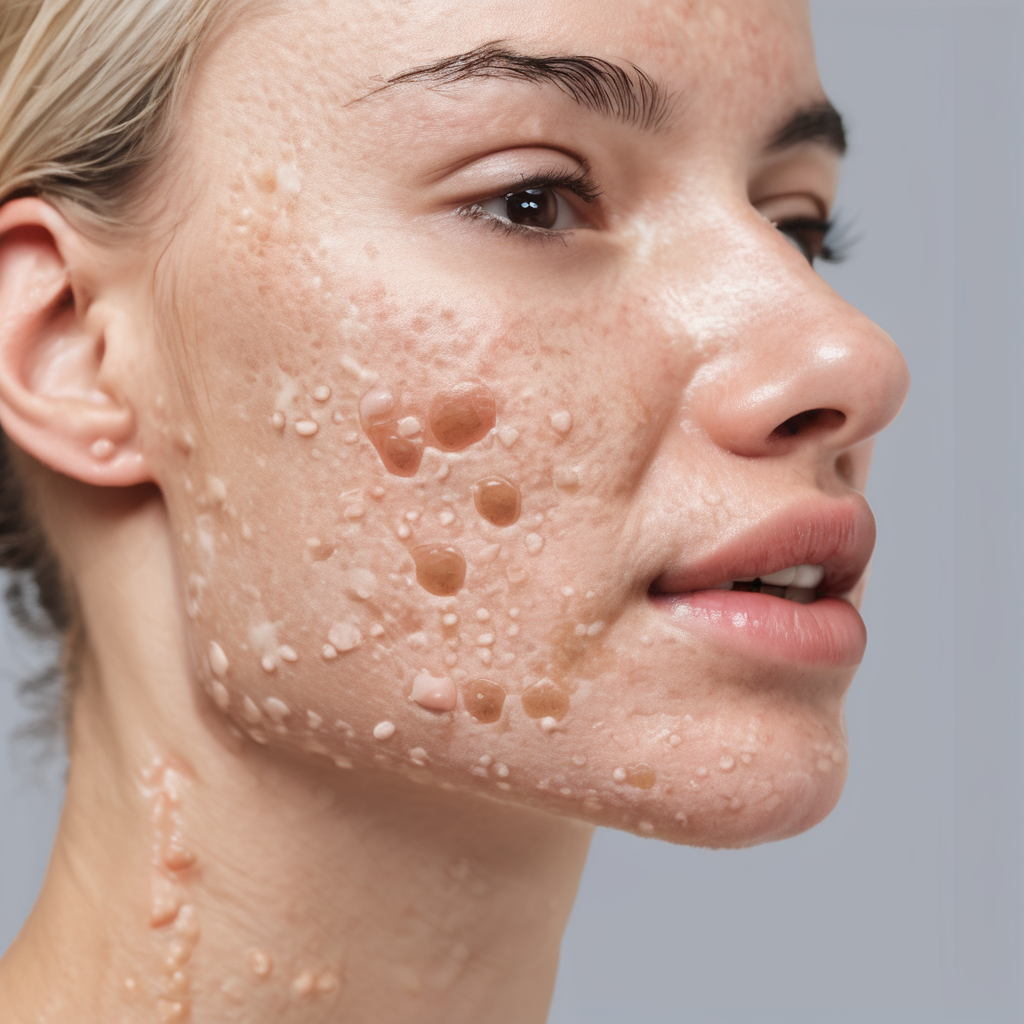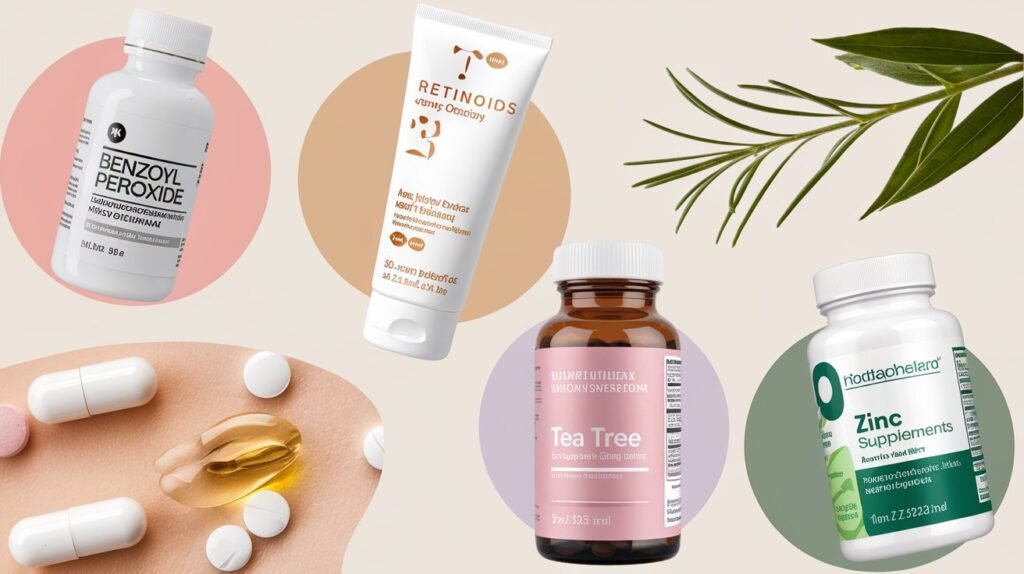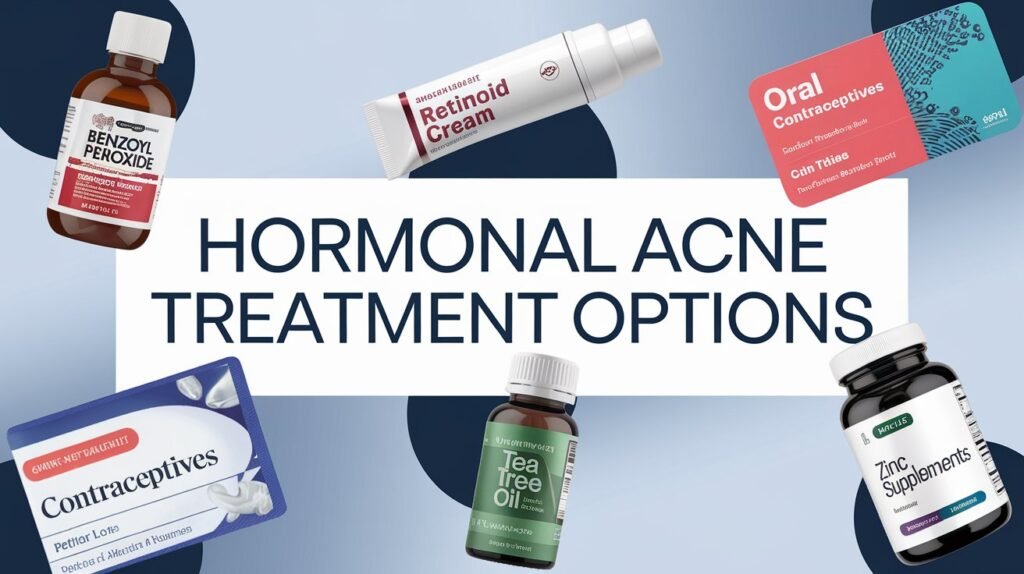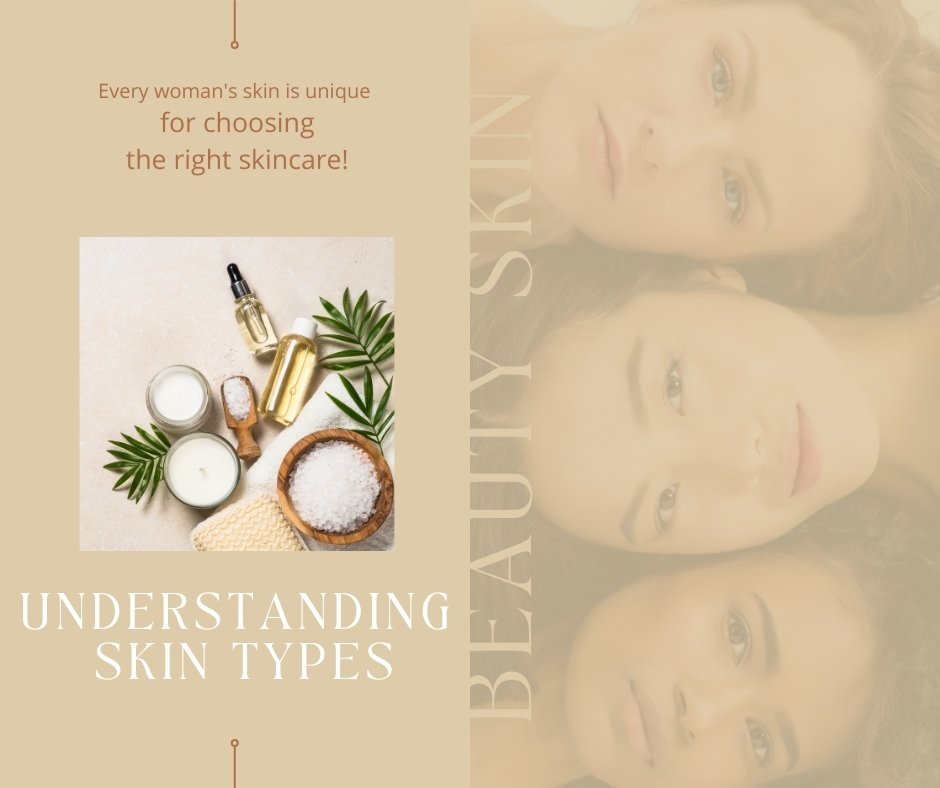Introduction
Hormonal acne is a common skin condition that affects individuals of all ages, particularly during puberty, menstruation, pregnancy, and menopause. It occurs due to fluctuations in hormone levels, leading to excess oil production, clogged pores, and inflammation. Understanding hormonal acne and its treatment options is crucial for achieving clear skin. This guide will explore effective hormonal acne treatments, including lifestyle changes, topical treatments, and prescription medications.
Table of Contents
Hormonal Acne Treatment
What is Hormonal Acne?
Hormonal acne is characterized by the development of pimples, cysts, and blemishes primarily caused by hormonal imbalances. Unlike other types of acne, hormonal acne often appears in specific areas, such as the jawline, chin, and cheeks.
Causes of Hormonal Acne
Several factors contribute to hormonal acne, including:
- Hormonal Fluctuations: Changes in estrogen, progesterone, and testosterone levels can lead to increased oil production.
- Genetics: A family history of acne may increase susceptibility.
- Diet: High-glycemic foods and dairy products can exacerbate acne.
- Stress: Stress triggers the release of cortisol, leading to increased oil production.
- Medications: Certain medications, such as corticosteroids and hormonal contraceptives, can contribute to acne.

Symptoms of Hormonal Acne
Hormonal acne manifests through various symptoms, including:
- Deep, painful cysts: Often found along the jawline and chin.
- Inflammation: Red, swollen areas on the skin.
- Scarring: Potential for long-term scarring if not treated effectively.
Hormonal Acne Treatment Options
1. Lifestyle Changes
a) Diet
Adopting a balanced diet can significantly impact hormonal acne. Consider the following dietary tips:
- Reduce High-Glycemic Foods: Foods that cause rapid spikes in blood sugar can exacerbate acne. Focus on low-glycemic alternatives like whole grains, legumes, and vegetables.
- Limit Dairy Intake: Some studies suggest a link between dairy consumption and acne due to hormones present in milk.
- Increase Anti-Inflammatory Foods: Foods rich in omega-3 fatty acids (such as salmon, walnuts, and flaxseeds) can help reduce inflammation.

b) Stress Management
Managing stress is vital for controlling hormonal acne. Consider incorporating the following practices:
- Mindfulness and Meditation: Techniques such as yoga and meditation can lower cortisol levels.
- Regular Exercise: Physical activity helps reduce stress and improve overall well-being.
2. Topical Treatments
Topical treatments can help manage hormonal acne by targeting the skin’s surface. Here are some effective options:
a) Benzoyl Peroxide
Benzoyl peroxide is a common over-the-counter treatment that kills acne-causing bacteria and reduces inflammation. It is particularly effective for mild to moderate acne.
- Usage: Apply a small amount to the affected area once or twice daily.
- Side Effects: May cause dryness and irritation.
b) Salicylic Acid
Salicylic acid is a beta-hydroxy acid that exfoliates the skin, unclogs pores, and reduces oil production.
- Usage: Include in your skincare routine by using cleansers or spot treatments containing salicylic acid.
- Effectiveness: Can reduce acne lesions and improve skin texture over time.
c) Retinoids
Topical retinoids, such as adapalene and tretinoin, are derived from vitamin A and promote cell turnover.
- Usage: Apply a pea-sized amount to the entire face once daily at night.
- Effectiveness: Studies show retinoids can reduce acne lesions by up to 70%.
| Topical Treatment | Effectiveness | Common Side Effects |
|---|---|---|
| Benzoyl Peroxide | 50-60% | Dryness, irritation |
| Salicylic Acid | 40-70% | Peeling, redness |
| Retinoids | 70% | Dryness, irritation |
3. Prescription Medications
For moderate to severe hormonal acne, a dermatologist may prescribe medications. These may include:
a) Oral Contraceptives
Hormonal contraceptives can regulate hormone levels in women, reducing acne flare-ups.
- Effectiveness: Studies show that certain birth control pills can decrease acne by up to 60%.
- Side Effects: Nausea, headaches, and mood changes.
b) Spironolactone
Spironolactone is an anti-androgen medication that reduces levels of testosterone and limits oil production.
- Effectiveness: Clinical studies indicate a success rate of 70% in reducing hormonal acne.
- Side Effects: Dizziness, menstrual irregularities, and potential increased potassium levels.
c) Isotretinoin
Isotretinoin (Accutane) is a potent oral retinoid for severe cases of acne.
- Effectiveness: Up to 85% of patients experience significant improvement after a course of treatment.
- Side Effects: Dry skin, potential birth defects, and the need for regular monitoring.
4. Natural Remedies
Some individuals prefer natural acne remedies for hormonal acne. While these may not be as effective as medical treatments, they can provide supportive care:
a) Tea Tree Oil
Tea tree oil has antibacterial and anti-inflammatory properties that can help reduce acne lesions.
- Usage: Dilute with a carrier oil and apply to affected areas.
- Effectiveness: May reduce acne lesions by 24% over a few weeks.
b) Zinc Supplements
Zinc has anti-inflammatory properties and plays a role in skin health.
- Effectiveness: Clinical trials show a reduction in acne lesions by 50% after three months of zinc supplementation.
- Side Effects: Stomach upset, especially when taken on an empty stomach.
| Natural Remedy | Effectiveness | Common Side Effects |
|---|---|---|
| Tea Tree Oil | 24% | Skin irritation |
| Zinc Supplements | 50% | Stomach upset |

Hormonal Acne Treatment: Preventive Measures
Preventing hormonal acne from worsening involves consistent skincare practices and lifestyle adjustments:
Skincare Routine
- Use Non-Comedogenic Products: Choose makeup and skincare products labeled “non-comedogenic” to avoid clogging pores.
- Gentle Cleansing: Use a mild cleanser twice daily to remove excess oil and impurities.
Hormonal Balance
- Monitor Menstrual Cycle: Keep track of hormonal fluctuations and adjust treatments accordingly.
- Consult with a Healthcare Provider: Regular check-ups can help manage underlying hormonal issues.
Success Rates of Different Hormonal Acne Treatments
| Treatment | Success Rate | Duration for Results | Side Effects |
|---|---|---|---|
| Isotretinoin | 85% | 6-9 months | Dry skin, birth defects |
| Oral Contraceptives | 60% | 3-6 months | Nausea, headaches |
| Spironolactone | 70% | 2-3 months | Dizziness, menstrual changes |
| Topical Retinoids | 70% | 8-12 weeks | Redness, peeling |
| Tea Tree Oil | 24% | 6-8 weeks | Skin irritation |
| Zinc Supplements | 50% | 3 months | Stomach upset |
FAQs About Hormonal Acne Treatment
Here are some frequently asked questions (FAQs) about hormonal acne treatment:
1. What is hormonal acne?
Hormonal acne is a type of acne caused by fluctuations in hormones, often seen during puberty, menstruation, pregnancy, menopause, or conditions like polycystic ovarian syndrome (PCOS). It typically appears on the lower face, jawline, and chin.
2. How do hormones cause acne?
Hormonal imbalances, especially an increase in androgens like testosterone, can cause excess oil production (sebum), which clogs pores and leads to acne. Hormones also trigger inflammation, making acne worse.
3. What are the common treatments for hormonal acne?
Treatments for hormonal acne can include:
- Topical treatments: Retinoids, benzoyl peroxide, or salicylic acid.
- Oral medications: Birth control pills, spironolactone, and antibiotics.
- Lifestyle changes: Dietary modifications, stress management, and improving sleep.
- Natural supplements: Zinc, omega-3 fatty acids, and Vitex (chasteberry).
4. Are birth control pills effective for hormonal acne?
Yes, certain birth control pills help regulate hormones and reduce the androgen levels responsible for acne. Pills containing both estrogen and progestin are often prescribed to women to manage hormonal acne.
5. What is spironolactone and how does it help with hormonal acne?
Spironolactone is an anti-androgen medication that helps reduce oil production by blocking androgen hormones. It’s often prescribed for women dealing with persistent hormonal acne.
6. Are there any side effects of hormonal acne treatments?
Yes, hormonal acne treatments can have side effects, depending on the medication. For example:
- Birth control pills: Nausea, weight gain, and mood swings.
- Spironolactone: Increased urination, irregular periods, and breast tenderness.
- Topical treatments: Dryness, redness, and skin irritation.
7. Does diet affect hormonal acne?
Yes, diet plays a role in hormonal acne. High glycemic index foods (like refined carbs and sugar) can spike insulin levels, which may increase androgen production and trigger acne. A diet rich in whole foods, fiber, and healthy fats can help manage acne.
8. Can stress cause hormonal acne?
Yes, stress can cause your body to release cortisol, a stress hormone that can lead to increased oil production and worsen hormonal acne. Stress management techniques like meditation, yoga, and regular exercise can help reduce breakouts.
9. How long does it take to see results from hormonal acne treatments?
It can take anywhere from a few weeks to a few months to see significant improvements. Topical treatments often show results within 6-8 weeks, while oral medications like birth control or spironolactone may take up to 3 months for full effects.
10. Are there any natural remedies for hormonal acne?
Yes, natural remedies for hormonal acne include:
- Dietary supplements: Zinc, omega-3s, and vitamin D can help reduce inflammation.
- Herbal supplements: Vitex (chasteberry), saw palmetto, and evening primrose oil are believed to balance hormones.
- Tea tree oil: Has antimicrobial properties and can be used topically to reduce acne.
11. Can hormonal acne be treated permanently?
Hormonal acne can be managed but may not be “permanently cured,” especially if caused by chronic hormonal conditions. Consistent treatment and lifestyle changes are often required to keep it under control.
12. Is hormonal acne more common in women?
Yes, hormonal acne is more common in women due to menstrual cycles, pregnancy, and hormonal fluctuations linked to conditions like PCOS. However, men can also experience hormonal acne, especially during puberty.
13. Can skincare products help treat hormonal acne?
Yes, choosing the right skincare products can help manage hormonal acne. Look for non-comedogenic (non-pore-clogging) products and ingredients like salicylic acid, niacinamide, and retinoids, which are known to help acne-prone skin.
14. When should I see a dermatologist for hormonal acne?
If your hormonal acne is severe, persistent, or causing scarring, it’s a good idea to consult a dermatologist. They can recommend prescription treatments like retinoids, oral medications, or chemical peels that may not be available over-the-counter.
15. Can hormonal acne worsen during certain times of the month?
Yes, many women notice that their acne worsens during certain times in their menstrual cycle, particularly around ovulation or just before their period, due to fluctuations in estrogen and progesterone.
These FAQs can serve as a helpful resource for anyone seeking information about hormonal acne treatments. Let me know if you’d like to expand on any of these points!
Conclusion of Hormonal Acne Treatment
Hormonal acne can be a challenging condition, but understanding the various treatment options available can lead to clearer skin. From lifestyle changes and topical treatments to prescription medications and natural remedies, there are effective solutions for Hormonal Acne Treatment. Consulting with a dermatologist will help create a personalized treatment plan tailored to your specific needs. By addressing hormonal imbalances and maintaining a consistent skincare regimen, you can achieve healthier, clearer skin.
References
- Del Rosso, J. Q., & Zeichner, J. A. (2018). Cystic Acne: A Review of Pathophysiology and Treatment Options. Journal of Clinical and Aesthetic Dermatology, 11(5), 43-49.
- Zaenglein, A. L., Pathy, A. L., Schlosser, B. J., Alikhan, A., Baldwin, H. E., Berson, D. S., … & Graber, E. M. (2016). Guidelines of care for the management of acne vulgaris. Journal of the American Academy of Dermatology, 74(5), 945-973.
- Zaenglein, A. L., & Thiboutot, D. (2016). Hormonal Treatment of Acne. Dermatologic Clinics, 34(2), 203-208.
- Draelos, Z. D. (2018). The role of diet in acne treatment. Journal of Clinical and Aesthetic Dermatology, 11(4), 22-27.




